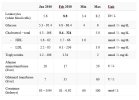I went for a check-up last week and had blood tests and an ECG done, and went over the results with the doctor.
I started Paleo April 2011, was in ketosis for a few years 2013-2015/16 approximately, and have been low carb paleo ever since. I haven't completely avoided vegetable oils, but I most certainly do NOT use them nor consume them regularly. Some alcohol has been imbibed over the past few years. I've been completely gluten-free since 2011.
I also did an Omega 6 to Omega 3 ratio blood test (pricked finger) via the Fish Oil company ZinZino, and the ratio was 8.6 to 1 (so not good, but moderate). I'm taking the Norwegian ZinZino oil to test it out.
Blood pressure: good
Resting pulse : 52 beats per min, excellent
ECG: normal
Hemoglobin, Erytrocyes, platelets: normal
Using http://www.hughcalc.org/chol-si.php :
Your Total Cholesterol of 8.40 is HIGH RISK
Your LDL of 6.08 is VERY HIGH RISK
Your HDL of 1.7 is OPTIMAL
Your Triglyceride level of 1.35 is NORMAL
RATIOS:
Your Total Cholesterol/HDL ratio is: 4.94 - (preferably under 5.0, ideally under 3.5)
GOOD
Your HDL/LDL ratio is: 0.280 - (preferably over 0.3, ideally over 0.4)
AT RISK
Your triglycerides/HDL ratio is: 0.794 - (preferably under 1.74, ideally under 0.87)
IDEAL
I did blood work in January 2010, before Paleo/Keto/Gluten-free
Screen shot: table of basic blood tests 2010 - 2018
Outcome with Doctor:
The doctor didn't know much about the chemistry involved, and admitted he needs to read up more and also to look at the more recent research on natural fats such as coconut oil, animal fat, butter, olive oil etc - he called them "bad, hard fats". The doctor would have prescribed statins for me as there has been some history of heart disease on both sides of my family, and the doctor was also alarmed from the increase of cholesterol from 4.3 to 8.4 with LDL going from 2.2 to 6.1 from 2010 to 2018. I gently but firmly discussed the chemistry behind this, as before meeting with the doctor to go over the tests I spent several hours on the forum getting back up to speed on cholesterol and inflammation overall. Thank you Forum! :)
The doctor gave me a printout of how to reduce cholesterol using vegetable oils. I clearly stated that I do not eat any processed food or oils, only natural oils that come from nature, and brought up the concept of oxidation with respect to vegetable oils. I also emphasized I am concerned about inflammation, and flatly stated that cholesterol does not cause inflammation, and is only a transport mechanism of lipoproteins to and from the liver. The doctor somewhat weakly stated that the link between high cholesterol and heard disease is 'fairly' clear.
I presented one extensive research article to the doctor (
https://cassiopaea.org/forum/index.php/topic,26327.msg679356.html#msg679356) as I had my abovementioned ratios and abstract of this article printed in advance, and the doctor seemed interested and open for more. I will send a few more links to the doctor.
The doctor is sending me to a specialist to do a clinical stress test (exercise ECG) to further investigate my heart.
The doctor wants me to do a thyroid test and the cholesterol tests again in May.
Although the doctor was polite, there was definitely pressure to take statin medication as the doctor brought it up 3 times during the visit ONLY because of the "high" cholesterol levels!
As otherwise with blood pressure very good, resting pulse excellent, ECG just fine, and no other definite heart-related symptoms, why would a doctor prescribe evil statins! (maybe a medical requirement, understandably).
My thoughts and questions:
My liver is ok, but it could be better, it is good to see some improvement over 8 years from 20 U/L to 17 U/L. That 35 U/L of glutamyl-transferase bugs me.
Good to see kidneys seem ok.
Glucose drop from 5.3 to 4.8 over 8 years is good, but I thought it would be better since being low carb.
The white blood cells might be up because of smoking, but I'm wondering if this could indicate some inflammation.
The Omega 6 to Omega 3 ratio is 8.6 to 1, so my body may be at risk of some of inflammation in that respect.
I am not concerned about the high LDL 6.1 / 236, or the overall high cholesterol 8.4 /324 , but I am wondering why HDL is slow low at 1.7 / 66, with a very small increase from 1.6 / 62 in 2010 before knowing anything about the diet? The knowledge from this Forum has shown that cholesterol levels don't mean much, but there could be some indication of an underlying inflammation.
The question I ask, and have asked myself over the years, is how to reduce inflammation. There have been on and off sleeping problems, partially that has to do with a neck pain problem that has persisted for over a year. Some stress, being surrounded by wireless technologies daily, a fairly hectic family life which due to being fairly high in personality trait neuroticism, can get to me at times. Over the years, with the help of EE and the knowledge from this Forum, my stress levels have tended to decrease. I'm not exercising that much either, mainly walks once a week, along with once a week with a medium intensity cardio-type circuit training (that I miss time to time).
I will see a traditional 'healer' / traditional medicine practitioner who has an excellent reputation. We'll see what he can do with my neck pain, overall inflammation reduction, and deep tissue (emotional) work. I plan to work with this practitioner over the next several months starting hopefully at the end of March (he has a long waiting list).

